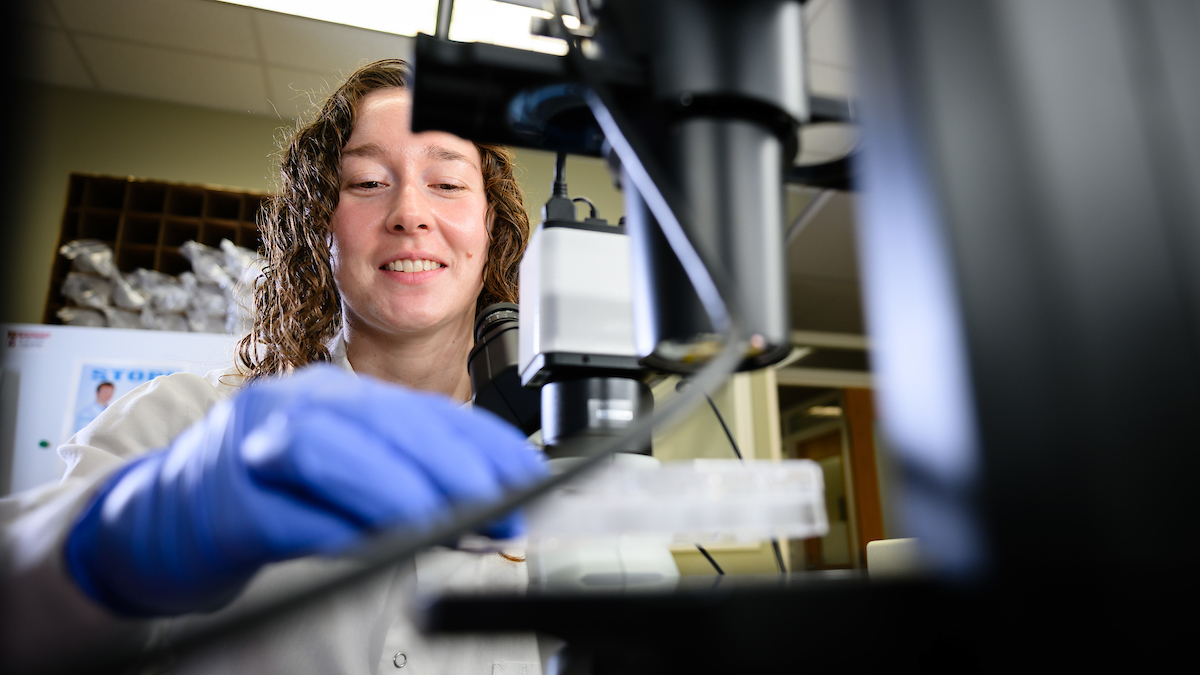Novartis Aids CVM Research
The College of Veterinary Medicine (CVM) at North Carolina State University is the recipient of a $625,000 gift from Novartis Animal Health US, Inc., to help support the Clinical Trials Program administered by the CVM Center for Comparative Medicine and Translational Research.
Presented over a five-year period, the Novartis gift will fund a clinical trials veterinarian, a veterinary research technician, and laboratory space and equipment that will be dedicated to supporting clinical research studies involving patients in the CVM Veterinary Teaching Hospital.
“Clinical studies are integral to the advancement of veterinary medicine,” says Dr. Gregg Dean, director of the Center for Comparative Medicine and Translational Research (CCMTR). “Such studies investigate risk factors for disease as well as methods to prevent, treat, or cure illnesses that affect both animals and humans. The Novartis gift will fund resources that are critical to helping the CCMTR ensure an effective Clinical Trials Program.”
“Novartis Animal Health is a proud supporter of the College of Veterinary Medicine at North Carolina State University, especially in the opportunity to contribute to the development of the school’s Clinical Trials Program (CPT),” says Dr. Gary Bosch, vice president for research and development for Novartis animal Health in North America. “We recognize the veterinary program at North Carolina State as a center of excellence for clinical research in veterinary medicine, and believe that this gift will support the advancement of research and the development of innovative solutions for animal health problems.”
Dean says the CCMTR Clinical Trials Program (CTP) enables clinical investigators the opportunity to evaluate novel approaches to diagnose and treat disease and deliver innovative solutions that enhance animal and human health. The CTP promotes research collaboration by serving as a liaison between clinical investigators, basic researchers, referring veterinarians, pet owners, and industry scientists. In addition, participating in the program may help interest DVM students and residents in exploring careers in translational medicine.
The CTP can assist with or independently design and implement all organizational and technical aspects of clinical trials including case recruitment, patient enrollment, patient visits, sample collection and processing, and patient follow-up and data analysis. There are currently 19 ongoing investigations in seven hospital clinics: Cardiology, Dermatology, Internal Medicine, Neurology, Oncology, Pain Management, and Surgery.
According to Dean, a dedicated clinical trials enterprise is an essential component of an evidence-based medicine approach to determine the standard of care. Such trials, he says, enable clinical investigators to determine the best way to treat specific medical conditions while offering patients access to the most advanced diagnostic and therapeutic technology available.
“We are particularly pleased with the Novartis support,” says CVM Dean Warwick Arden. “The Novartis gift will help us continue building a clinical trial framework that will become self supporting as it matures into a premiere national veterinary clinical trials program. We envision that the CTP will also conduct trials that will have implications for the treatment of people, making the program unique in the veterinary and human medical fields.”
[section_subtitle]About the CCMTR [/section_subtitle]
The mission of the CCMTR is to enhance collaborative, translational, interdisciplinary approaches for the comparative study of animal and human diseases. The CCMTR involves more than 100 researchers from five NC State colleges and the Veterinary Teaching Hospital. The work of the Center is organized around innovation, translation, and utilization initiatives. Innovation focuses on research collaborations among clinical and bench researchers that will lead to translation and testing through clinical trials. The utilization component seeks partnerships with private industries to develop new medicines, treatments, and biomedical devices for the benefit of veterinary and human medicine.
Posted July 1, 2008


